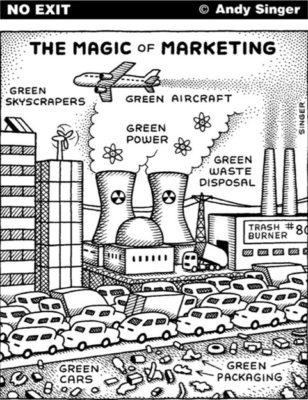

Out of two years of a severe slowdown of the global economy, growth is back, good news for most humans, no good news for the climate. Does this growth to come look like this cartoon?

Sustainable, not “green”, growth is a subject of speculation: Will it be improved by renewable and circular technologies or shall we be obliged to scale down our Anthropocene lifestyle, substituting consumerism-driven growth by a more sober, cooperative, socially just, inclusive, new type of growth?
Citizens in Western democracies worry a lot: climate anxiety ranks high, for sure, but rising inequalities affect, big time, the middle-classes, afraid to be rejected below the poverty threshold, and every crisis, like the brutal exit from the pandemic, which played havoc on global supply chains, or the warring in Eastern Europe, exacerbates the worries on the spending power, forcing presentism-addicted politicians to respond urgently. And when everything is urgent, nothing really is. Long-term strategies just end up shoved on the back burner. Life goes on, climate mitigation nevertheless does show some progress, with its own pace, too slow for fearmongers, rather on the adaptation mode than on the revolutionary one.
The European Union makes a brave effort to be holistic in its fight against climate change, the Fit-for-55 Package does look like the planetary lab scale experiment on climate-friendly regulations and solutions. Lacking nuance and diversity, in my opinion.
Even if this does not please the fearmongers and the old-style zealots of the magic solution (their own, of course), we have to accept our political regime calls for a pragmatic transition, to create a yet unknown new style of growth, but definitely away from extreme dogma, be it high tech or de-growth, lest we kill the patient as much as its illness. Cooperation between sectors is key to such a pragmatic transition, although not necessarily mainstream in the capitalist tradition, ruled by supplier-purchaser relationships, based on harsh negotiation and balance of power. And cooperation may well generate transitory “hybrid” solutions, like, in air transport, combining liquid aviation fuel, sustainable of course, for take-off and landing, and hydrogen propulsion at high altitude. And aren’t hybrid cars, plug-in or not, the (not) missing link between ICEV and BEV?
The good news is that such cooperation has been around for quite some time in the bioenergy sector, which could become a learning ground toward a more sustainable world:
Agriculture, forestry, fuels and engine manufacturing sectors have been working together for decades to make biofuels, ethanol, FAME, renewable diesel, a reality in road transport. Blend walls exist, for instance of a technical nature for gasoline, but can be overcome by inexpensive kits allowing a standard gasoline-powered car to become a flex-fuel vehicle: quite a success in France with crude oil shooting beyond 100 $ per barrel. Public acceptance is quick to obtain when spending power is at stake. And road transport improved sustainability comes easier, faster and cheaper.
The bioenergy sector has also known to adapt its output to various sectors, electricity generation, fuels, materials, and adapt its input as well, from staple agricultural products, grains, sugar, oilseeds, to waste and residual feedstocks: such a versatility implies a strong capability to cooperate with downstream sectors, understand and foresee their needs and regulatory constraints.
And cooperation can also be understood in geographical or geopolitical terms, as vast reserves of bioenergy resources lie in less advanced countries, the most exposed to the consequences of climate change. No need to make huge transfer of funds for sophisticated technologies or expensive infrastructure investments, as the underlying fossil-fuel production and distribution means are in place. Much needed jobs and some energy independence as additional benefits.
Philippe Marchand is a Bioenergy Steering Committee Member of the European Technology and Innovation Platform (ETIP).